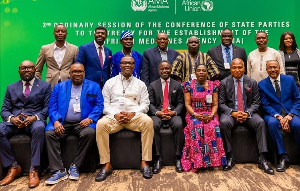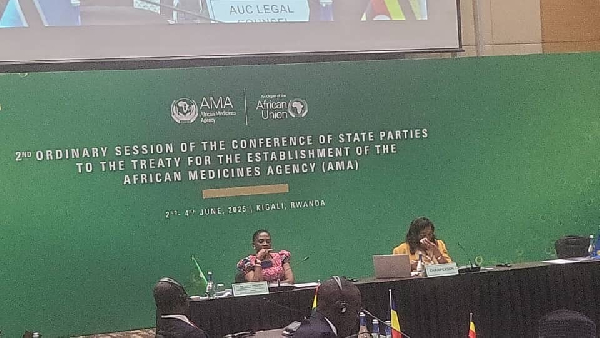Market women aren't the real obstacle to Accra's decongestion-Blame the 'Abaye' - Fiifi Annan writes
To me, this entire decongestion exercise being led by the Accra Metropolitan Assembly (AMA) is just another nine-day wonder. Let’s be honest: you can’t solve a problem without having a ready solution.
Until the real antidote to this persistent eviction of market men and women from Accra’s pavements is found, no one—and I repeat, no one—will succeed in any meaningful decongestion effort.
Let’s walk through this.
This is not the first time the government has embarked on a decongestion exercise in Accra. On May 18, 2021, Henry Quartey, the then Greater Accra Regional Minister led over 600 security personnel to clear the Central Business District (CBD) of illegal structures and street traders. That campaign, dubbed “Make Accra Clean,” was launched with support from the AMA.
Go further back to 2009 under former Mayor Alfred Oko Vanderpuije, and you’ll see a similar operation. I could keep listing examples, but I won’t. My point is this: I don’t support hawking on pavements or in unauthorized places. That said, the traders are not the biggest problem here.
Fast-forward to 2025. The newly appointed Mayor of Accra, Michael Kpakpo Allotey—clearly selected for his competence—launched another decongestion operation on May 20. Once again, the CBD was targeted. Areas like Kinbu Street, Makola, CMB, Circle, and Kaneshie were cleared. But guess what? Within days, everything returned to the status quo.
I dare say the entire exercise yielded little to no result.
A stroll through Makola and Kantamanto shows that the same streets earlier cleared are now overrun by traders again. Red paint marks the pavements as “no-go zones” for hawkers, but traders are still selling right on top of those markings. The pavements in front of and opposite the Ghana School of Law are just as choked as before.
Yes, some traders will argue they haven’t crossed the red line—but the point is moot. The spaces meant for pedestrians are still blocked. And heaven help you if you bump into their goods; they’ll rain insults or curses on you for infringing on your own right of way.
To be fair, I don’t think any government—past or present—has ever been against people earning a living. What we all want is simple: a clean, safe, and decongested city.
But again, the market women are not the problem.
Let’s ask the real question: Why do these decongestion efforts repeatedly fail across administrations?
Here’s the hard truth—traders are being enabled by the very people tasked with preventing them from selling in unauthorized spaces.
Yes, the “abaye”—those AMA task force members—are part of the problem.
You might ask, “How is that possible?”
Is the AMA unaware that these officers routinely collect bribes from traders to let them operate illegally? Is the Assembly not aware that some of their officers’ wives or family members are among those selling on pavements—off-limits when the mayor or superiors aren’t around?
The truth is, the mayor can’t be everywhere. But his task force—those he entrusts with enforcement—are sabotaging the mission.
Some of these officers take foodstuffs from traders in exchange for “protection.” The “abaye” only intimidate those who refuse to settle them—either in cash or kind. Some traders are so emboldened by these illicit arrangements that they proudly declare, “Unless the president comes here himself, no one can sack me.”
And who can blame them? If a task force member collects GHS 5 from 100 traders each day, that’s GHS 500 in his pocket. Why would he chase them away? Especially when that’s how he earns his daily bread. Why evict someone who brings you lunch?
That’s the heart of the problem.
Until we break this unofficial arrangement—where unauthorized trading is protected by informal payments—Makola, Kantamanto, and Kaneshie will never be truly decongested.
What’s the solution?
Start by training and properly compensating enforcement officers. A well-paid officer is less likely to accept GHS 5 bribes. Raise standards, implement oversight, and punish internal corruption.
But let’s not stop there. We must also ask: where should these traders go?
Market spaces in Accra are full. If we evict traders without providing alternatives, what happens next? They’ll simply return—and who can blame them? They have families to feed.
The government’s 24-hour economy plan, which includes a rotational trading system, is a bold idea. But is it practical?
What guarantees do traders have that they’ll meet their sales targets if they’re allowed to sell only on specific days? And what happens when sales don’t come through? Do they starve?
Decongesting Accra is more complex than dispatching officers to chase traders. It requires a holistic, compassionate approach that addresses both the supply of unauthorized trading and the demand created by poor enforcement, limited market infrastructure, and economic hardship.
This is not an NDC problem. It’s not an NPP problem. This is a national challenge—one that has persisted for decades. I sincerely hope this administration will adopt a truly multifaceted strategy to bring lasting change.
Because until then, the traders will return—and the “abaye” will welcome them with open arms.












